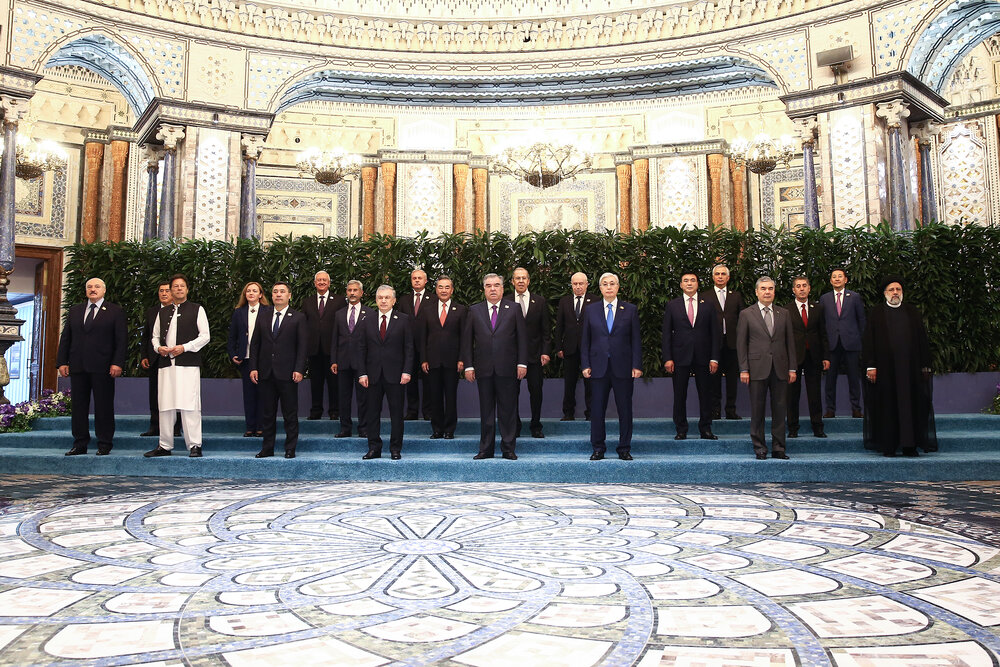With SCO membership, Iran rolls out new orientation

TEHRAN – While the West impatiently waits for an affirmative nod from Iran for resuming the stalled Vienna nuclear talks over reviving a 2015 nuclear deal, the new administration of Iran patiently carves a strategic path toward cementing ties with the East.
A major step on that path was taken on Friday when Iran announced that it ended a 16-year-old peripheral status at the Shanghai Cooperation Organization (SCO) to become a full member in the regional body.
“At the end of the 21st Summit of the Shanghai Cooperation Organization (SCO), held in the Tajik capital Dushanbe, the leaders of the eight main members of the organization agreed to change the membership of the Islamic Republic of Iran from an observer member to a full member and signed the relevant documents,” the Iranian presidency said in a statement. “Accordingly, the technical process of Iran becoming one of the main members of the organization has begun and Iran will henceforth cooperate and interact with member countries as the main member of the important regional organization.”
The membership was achieved during the first foreign visit by Ayatollah Seyed Ebrahim Raisi in his capacity as Iran’s president. So, it gives the Raisi team a boost at the start of their Asia-oriented foreign policy.
Iran’s joining the SCO could be the first step on the path of the Raisi administration’s stated policy of strengthening relations with neighbors and regional organizations.
Addressing the SCO summit in Dushanbe, Ayatollah Raisi elaborated on this policy. “When I took over the presidency of the Islamic Republic, I introduced my foreign policy orientation as focusing on ‘economic multilateralism’ and strengthening ‘neighborhood policy’ in its broadest sense, and strengthening its presence in regional organizations,” he said.
The Iranian president added, “The combination of the Eurasia and One Road-One Belt initiatives can be an objective realization of this approach, and the vast potential of the Islamic Republic of Iran in terms of geopolitics, population, energy, transportation, human resources, and most importantly spirituality, culture and civilization can cause a significant stimulus to this outlook.”
Iran’s top diplomat, Hossein Amir Abdollahian, described the country’s membership in the SCO as “strategic” that will have an important impact on Iran’s “comprehensive” cooperation within the framework of the Neighborhood and Asia-oriented Policy.
The membership was made possible due in part to Russia’s support and diplomacy. Preparations for the realization of Iran’s joining the SCO first came to light in mid-August when Ali Shamkhan, Secretary of Iran’s Supreme National Security Council, announced after a phone call with his Russian counterpart Nikolai Patrushev that Iran will soon become a full member of the SCO.
“Fortunately, the political obstacles to Iran's membership in the Shanghai CO have been removed & Iran’s membership will be finalized,” Shamkhani said on Twitter in August.
Abdollahian also said that his Russian counterpart Sergei Lavrov and Russian President Vladimir Putin have supported Iranian membership. In a tweet on Friday, Abdollahian said he met with Lavrov on the sidelines of the SCO summit in Shanghai in Dushanbe and thanked him and Putin for their support of Iran’s membership in the organization.
Iran has been in talks with Russia and China in the last few years to sign long-term strategic partnerships that could shape its foreign policy for decades to come. By joining the SCO, Iran stepped closer to finalizing these partnerships and pushed forward its new Asia-centered foreign policy, which rests on two pillars: enhanced ties with neighbors and strategic partnerships with non-western powers.
Iranian Foreign Ministry spokesman Saeed Khatibzadeh underlined this new policy in a tweet on Friday.
“Warmly welcome the decision of the SCO to approve #Iran's full membership. A major step toward enhanced ties with neighbors & an important impetus for our Asia-centered foreign policy. We'll continue our efforts to build on indigenous initiatives for the good of the region,” Khatibzadeh said.
Leave a Comment